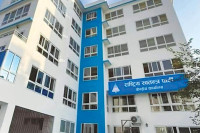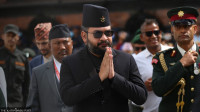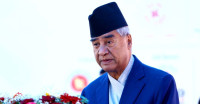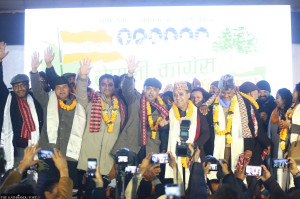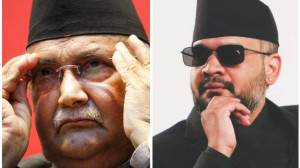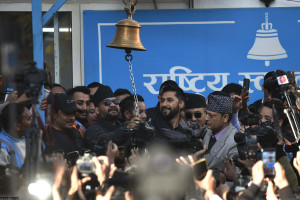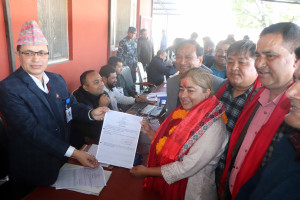Politics
Oli handed Dahal the party reins—and took it back just as quickly
Despite agreeing to make Dahal the executive chairman of the ruling party, Oli hasn’t shown willingness to let go of power..jpg&w=900&height=601)
Tika R Pradhan
Less than a week after Pushpa Kamal Dahal was made the executive chairman of the Nepal Communist Party, Co-chair KP Sharma Oli has pulled the rug out from underneath his co-chair, saying that he too is an executive chairman.
In an interview with Kantipur Television on Monday, Oli, who is also prime minister, said that he was not only the “other executive chairman” but also senior to Dahal, leaving analysts and party insiders to wonder what exactly is Dahal’s role in the party.
“I will consult him [Dahal] on governmental activities while he will consult me on party activities,” Oli said in the interview. “As far as seniority is concerned, I am the senior chair and he is the other chair. Even after giving him the role of the executive, we both will chair party meetings.”
On November 20, the party secretariat, after the two co-chairs met with President Bidya Devi Bhandari, reached the decision to appoint Dahal as ‘executive chairman’, ostensibly putting him in charge of the party while Oli ran the government.
Dahal, in an interview with Kantipur last week, had expressed relief, saying he finally felt like a chairman. He had then met with a number of senior party leaders, including Jhala Nath Khanal, Madhav Nepal and Bamdev Gautam. He is planning to chair the party’s standing committee and central committee meetings and discuss the formation of a politburo, which is the executive committee of any communist party.
But Oli’s comments this week indicate that he is in no hurry to allow Dahal to take full control of the party, something that party insiders and analysts had suspected ever since the announcement was made.
“The decision was nothing but a face-saving tactic for Dahal,” said Mani Thapa, a standing committee member. “I don’t think Oli is going to let Dahal run the party so easily.”
Oli’s statements have just created even more confusion within the party, according to party leaders, as it is not clear what exactly Dahal is authorised to do without seeking explicit agreement from Oli.
“The party statute has imagined executive roles for both co-chairs but the word ‘executive’ for Dahal has created confusion as to whether Oli is executive chairman or not,” said Beduram Bhusal, a standing committee member. “Whatever the explanation, I don’t think there will be any change in the role of the two chairs.”
Despite the pessimism of many within the party regarding Dahal’s role, leaders from Dahal’s camp remain adamant that Oli needs to abide by what he has agreed to.
“That’s Oli’s way of reacting to any issue,” said Bishnu Sapkota, Dahal’s press advisor, referring to the interview on Kantipur TV. “Since there is a clear agreement in writing, any statement he makes against that agreement won’t be of any significance.”
Dahal has long chafed under Oli’s thumb, despite the fact they are both equal co-chairs in writing. Oli has long monopolised decision-making in the government and in the party. He has attempted to isolate Dahal by elevating former UML leaders like Bamdev Gautam to senior positions within the party. Before his recent Cabinet reshuffle, Oli attempted to woo all factions, including that of Madhav Kumar Nepal and Dahal himself. But Dahal, who led the Maoist party for three decades, is not one to work comfortably under another, say political analysts.
“Oli’s quick reaction over Dahal’s role in the party shows that the power struggle between the two top leaders will continue,” said Shyam Shrestha, a political commentator. “Party functioning is bound to suffer as long as they don’t internalise their decision and accept each other’s role.”




 19.12°C Kathmandu
19.12°C Kathmandu

